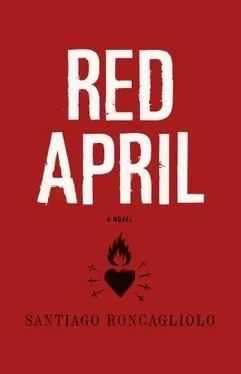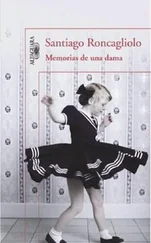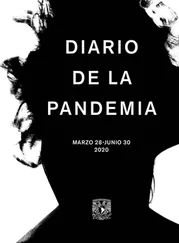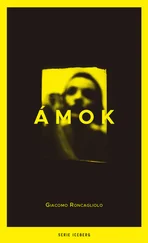“But Lieutenant! The correct thing was …”
He could not go on. The continuation of that sentence was obscure, perhaps impossible. The lieutenant turned his back and went into the station. Chacaltana looked for a glance of support in the other policemen, who responded to him by dispersing, one by one.
The prosecutor returned to Cahuide's house. He knocked on the door several times, but no one answered. He went up to the window. Cahuide was there. From the interior he looked back at him with a mixture of pity and fear. The prosecutor did not insist further. He crossed the half-deserted village feeling the distrustful looks piercing him from the windows. They did not answer the door in the house where he was staying either. This time, he did not even go up to the window. He continued walking until he reached the countryside.
As he walked, not doing anything, he thought about Edith. He missed her, her silver tooth, her table settings in a restaurant where he had never eaten. He thought that, for the moment, Edith was the only person waiting for him. He did not know if he should tell his mamacita about it. He stopped at a stream to skip stones the way his mother had taught him when he was little. He became sad. The way things were going, Edith would have no good reason to respect him. He would not be promoted. Perhaps that was better. If Yawarmayo was a promotion, he preferred to stay where he was. He took a deep breath. For a few moments he enjoyed the peaceful light and air in the countryside. He forgot where he was.
As the ripples disappeared on the surface of the water, images reappeared as geometrical reflections: a branch, a projecting rock, a tree trunk. The images of the countryside seemed small, insignificant, so different from the disordered, foul-smelling visions of the capital. Among the decomposing figures he saw the face of his ex-wife. Perhaps she was right, perhaps Chacaltana had never had any ambition and the best thing for him was to sit in an office in Ayacucho and write reports and prepare recitations of Chocano. Ayacucho was a city you could walk all around on foot; he liked that. And it was a safe place, sheltered from roundups and bombs in the night. His ex-wife's face was turning into his mother's face. The prosecutor would have liked to do something to make her proud of him.
He decided to go back. He took a last look at the stream. The figures continued to play on the water. One of them was becoming fixed as the surface settled down. At first it appeared to be a strange bird, but then the prosecutor looked more carefully. That was not a bird. It was the shadow of a man.
He did not look up. He wanted it to be nothing but an optical illusion. He had already seen enough in the past two days. His eyes were not accustomed to seeing so much. Slowly, he moved toward a spot where the stream narrowed. He jumped to the other side in order to leave. The shadow did not move. He took a few more steps. About two hundred meters away, two campesinos, each with a machete, approached on foot. He wanted to call to them but was afraid of provoking the shadow. He thought about moving closer to them. After a few more steps, he could not control himself any longer. He shouted:
“Excuse me! Señores!”
The campesinos turned toward him. They made a move toward him but then seemed to think better of it. They stopped. The prosecutor greeted them from a distance. They looked at him with curiosity. They said something to each other. He smiled at them. They resumed walking and moved away, speeding up the pace. The prosecutor wanted to follow them or call to them. It occurred to him to identify himself as an electoral observer. He realized that the best thing was to let them go. He listened to the sound of the branches as they moved. He tried to hurry too and reach the village. At that moment, he was hit on the back of his neck by a falling body.
The blow made him lose his footing. He almost fell in the water but held on to the branches of a bush and managed to crawl out from under the pressure of the man, who rolled a few meters and stood to throw himself at the prosecutor. Félix Chacaltana recognized the dwarfish silhouette he had seen the day before at the entrance to the village. As he tried to stand, he caught a glimpse of the old shoes with the tire soles and, above all, the same red chullo cap he had pursued days before in Quinua. Justino Mayta Carazo did not give him time for more before he leaped at his throat.
The prosecutor managed to hit him in the face with a branch and run toward the steep rocks. He found himself facing a stone wall. Justino came bounding after him. Chacaltana began to climb. He felt that each rock pierced his hands, that his feet were slipping on the falling rocks. He did not want to look down. He simply let himself be hit in the face by some of the stones dislodged from the wall as he advanced. The rocks ended in an embankment. The prosecutor took several seconds to reach the top, feeling that at any moment he might slip down to the bottom. But spreading before him at the top was a large ascending plain surrounded by another stone wall. He ran. Justino had climbed up very quickly but seemed to be limping slightly after his fall from the tree. The prosecutor sensed that Justino was gaining on him, but the slopes of the rise were too steep for him to descend any of them. He veered to the right, trying to reach the next wall in order to climb it. He tried and failed, feeling that altitude and exhaustion were overwhelming him. His heart was pounding, he needed air. He reached the slope and clung to the rocks with his hands. He began to climb, supporting himself on occasional projections. He hung from a cornice and pushed himself forward. The vertical surface seemed impossible to conquer. He spent his last breath in the effort and managed to rest on a rock and move a meter up from the ground. When he tried to take the second step, his foot rested on a false projection and slipped. The rock he was on gave way, and his entire body hurtled toward the ground in a small avalanche of stone and soil. He fell on his back.
The campesino picked him up from the ground and pinned him against the wall. Chacaltana had time to think of something to say:
“Señor Justino Mayta Carazo, you are liable for contempt and lack of respect for the law.”
The other man shouted something in Quechua. His voice betrayed more fear than courage.
“I assure you that I will bring you up on charges for your assault on my physical well-being …”
Frothing at the mouth and sputtering in Quechua, Justino began to squeeze Chacaltana's neck. For a moment, the prosecutor had the sensation that the air was escaping his lungs, his throat, his mouth trying to articulate that he was merely an electoral official. The campesino did not let him go; on the contrary, the pressure became harder and harder. With his right hand, the prosecutor felt around him until he found a stone, lifted it, and with all his remaining strength hit Mayta in the face. The campesino fell to the ground. The prosecutor needed to catch his breath before he got to his feet. He gulped in all the air he could. He felt as if his chest were about to explode. Off to one side, Justino raised his hand to his face. The prosecutor was afraid he would attack him again. But the campesino in the red chullo began to sob gently.
“I ain't done nothin', Your Worship! My brother's the one. He does everythin'! Everythin'!”
“Honestly, I don't understand what you're saying,” the prosecutor managed to say.
“My brother, it's my brother, Your Worship! I ain't done nothin'!”
Chacaltana understood he could not say much else in Spanish. He understood what Pacheco and Carrión were alluding to when they said these people do not speak, do not know how to communicate, it was as if they were dead. The campesino did not crawl on the ground. His body was square and solid from working the land, but he did not seem to threaten him now, it was more as if he were pleading. He had moved from aggressor to victim to unmoving man. The prosecutor thought that now he would let himself be taken away peacefully, having understood the principle of authority that made him subordinate to the Ministry of Justice. He wanted to take the campesino someplace where there was a translator. His testimony had to be something important. He thought about calling Ayacucho. But he would not find a telephone he could use. The campesino sank progressively lower and lower until he was sobbing at his feet. The prosecutor decided he would oblige the police to receive him and take his statement. They could not refuse. Sobbing and whimpering, the campesino kept talking about his brother. The prosecutor wondered to which jurisdiction Yawarmayo belonged and which judge he would appear before. Suddenly a new possibility occurred to him that he had not considered previously. Or, rather, he had assimilated the obvious. He looked again at the wretched man groveling on the ground. He asked him:
Читать дальше












